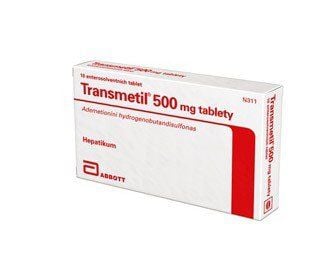Samarin 140 is used to treat liver dysfunction. This medication is widely available in pharmacies across the country. Let’s delve into its uses, instructions for use, and precautions through this article below
1. What is Samarin 140?
Samarin 140 belongs to the gastrointestinal medication group. It is developed and manufactured by Berlin Pharmaceutical Industry Co., Ltd and is distributed in Vietnam under registration number VN-20197-16.
The main ingredient of Samarin 140 is Silymarin 140 mg, extracted from milk thistle seeds. Additional ingredients include lactose monohydrate spray-dried, microcrystalline cellulose, sodium starch glycolate, magnesium stearate, butylated hydroxytoluene, Opadry brown, hydroxypropyl methylcellulose, propylene glycol, titanium dioxide, and talc.
Samarin 140 is formulated as round, brown, film-coated tablets with "B140" imprinted on one side. It is packaged in boxes containing 3, 10, or 25 blister packs, each with 10 tablets.
2. Indications for Samarin 140
Samarin 140 is prescribed for the following conditions:
- Acute and chronic hepatitis
- Cirrhosis
- Non-alcoholic fatty liver disease
- Hepatitis caused by bacterial infections
- Liver disease caused by alcohol consumption
- Liver damage due to metabolic toxins, fungal toxins, or carbon tetrachloride exposure
- Patients taking medications harmful to liver cells, such as cancer treatments, tuberculosis medications, diabetes drugs, NSAIDs, neurological medications, and anti-inflammatory drugs
- Individuals with liver dysfunction presenting symptoms like fatigue, indigestion, loss of appetite, jaundice, allergies, constipation, or urinary retention
- Prevention and treatment of liver cancer
3. Dosage and Administration of Samarin 140
Samarin 140 is formulated as tablets and is administered orally.
Dosage guidelines for Samarin 140:
- Liver protection: Take 420 mg/day, divided into 3 doses, for 6 to 8 weeks. The maintenance dose is 280 mg/day.
- Treatment of liver toxicity due to mushrooms: The dosage is 33 mg/kg/day.
4. Contraindications for Samarin 140
Samarin 140 should not be used in the following cases:
- Patients with a history of allergy or hypersensitivity to Silymarin or any of the excipients in the medication.
- Patients with hepatic encephalopathy.
- Patients with jaundice due to bile duct obstruction or primary biliary cirrhosis.
- Pregnant or breastfeeding women.
5. Side Effects of Samarin 140
Samarin 140 is generally well-tolerated. However, some patients may experience unwanted side effects, including:
- Nausea, diarrhea, bloating, abdominal discomfort, or loss of appetite
- Headache
- Allergic reactions to Silymarin
- Inform your doctor or pharmacist about any side effects experienced while taking Samarin 140.
6. Precautions When Using Samarin 140
Before using Samarin 140, patients should carefully read the package insert or strictly follow the guidance provided by doctors or pharmacists.
- Drug interactions: Silymarin inhibits Cytochrome P450 3A4 and Cytochrome P450 2C9. Studies in humans have shown that Silymarin does not affect the pharmacokinetics of Indinavir but may lower blood glucose levels in some patients with cirrhosis or diabetes.
- Combination with Metronidazole: When used concurrently with Metronidazole, Silymarin significantly increases the elimination and exposure of Metronidazole. If necessary, the dosage of Metronidazole should be adjusted.
- Pregnancy: There is no scientific data on the safety of using Silymarin during pregnancy. Therefore, its use is not recommended for pregnant women.
This information aims to provide patients with additional knowledge about Samarin 140. Patients should avoid self-medicating with Samarin without consulting a healthcare professional, as improper use may adversely affect health.
Please dial HOTLINE for more information or register for an appointment HERE. Download MyVinmec app to make appointments faster and to manage your bookings easily.
To arrange an appointment, please call HOTLINE or make your reservation directly HERE. You may also download the MyVinmec app to schedule appointments faster and manage your reservations more conveniently.








